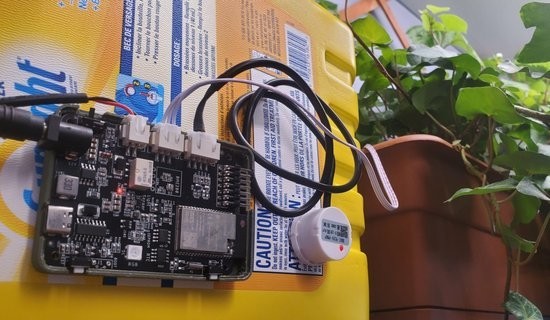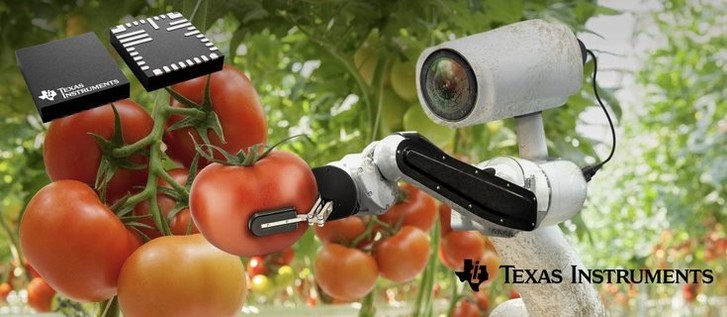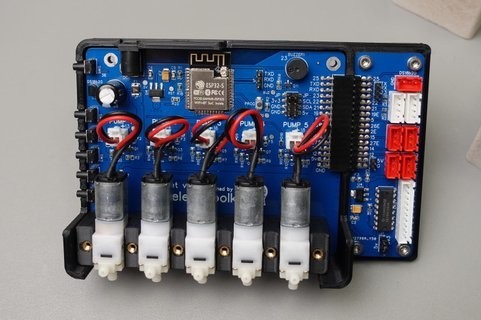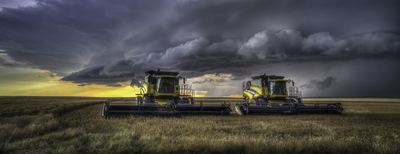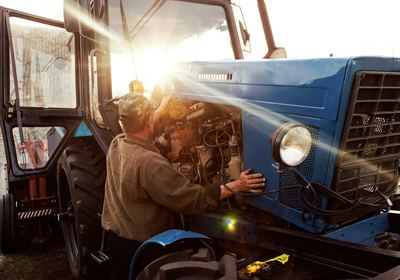Wonderful · @wonderful
49 followers · 206 posts · Server wonderful.socialKent vineyard uses drone technology to improve crop
A vineyard in Kent is using drones in the hope that they will help improve its crop. The specialist drones gather data, find out sunny spots and measure the soil humidity.
https://www.bbc.co.uk/news/av/uk-england-kent-66620908
#TechForGood
#SmartAgriculture
#DroneVineyardTech
#DataDrivenFarming
#techforgood #smartagriculture #dronevineyardtech #datadrivenfarming
Earthworm · @earthworm
437 followers · 1641 posts · Server kolektiva.social[This is a low-quality translation of a danish article of the newspaper information]
-- Larger, faster, wilder: A farm country's victory is killed --
The Netherlands has the world's most advanced and successful industrial farming. No one can grow a tomato more efficiently, and no one sends more meat around Europe. Now the nature stops.
WAGENINGEN, HOLLAND – Central in the Atlas Building at Wageningen University stands a young woman at a small podium and reads high from the latest climate report. She doesn't cry, the voice is not raised, her little protest summer as a mouse in the big floor.
Around her sit African, Asian and Dutch students. Some eat lunch, some make homework, some speak together with a cup of coffee. Some are as her highly concerned about the climate crisis, others are more admitted by what you have always been admitted to the Wageningen University: to optimise, streamline and increase production. Develop new technologies that enable us to force the most possible food out of at least possible soil with at least possible effort. Grise with several ribs, cows with greater udders, plants with many tomatoes.
The famous University is one of the sacred halls of the industrial farming. A cathedral over the borderless progress and a crucial part of what until a few years ago was considered an unconditional Dutch success story.
The Netherlands is a small country, less than Denmark, but one of the world's leading agricultural nation. Non-organic vegetables or the non-organic beef in the supermarket, are often produced in the Netherlands. No one can cultivate as many tomatoes, cucumbers or peppers per square metres as the Dutch. No one sends more meat around Europe. And no places have food production less common with Jens Hansen’s farm. Dutch agriculture is a science. It is milking robots, vertical cultivation and fully automatic greenhouses.
Last year the Netherlands earned more money with agricultural exports than Brazil. A country that is otherwise more than 200 times as big. In certain statements, the Netherlands is the second largest exporter of food, surpassed only by the United States. However, it requires that you also count the products that simply arrive in Rotterdam port to be distributed beyond Europe.
But no matter how to do it, the Dutch produce almost unlogical amounts of food. It is a high-tech power performance that has grown out of the Wageningen University, which has now established itself as the global center of the food industry. Food Valley calls the cluster of companies located around the university. The answers to Silicon Valley.
For more than 100 years, and in particular after World War II, Dutch agriculture has gone from victory to victory under the motto greater, wilder, faster. In recent years there has been a pressure to get it down again.
“Please, the list two the science and ACT,” stands at the podium in front of the young woman. Behind her has a statue of the Greek corn god Demeter from 1879 got a tie for her eyes. It is also part of a climate action.
I was actually well warned that the climate activists were moved behind enemy lines. Over the phone a pleasant farmer and former student named Judith told me that Wageningen once was a fantastic institution, but that I should fit:
“The hand is also a part of professors who are, what to say, vegan.’
And students, apparently.
“Polarization has also reached Wageningen,” says the person from the University’s press staff, Jan Bol – a mid-age man with a friendly, round head.
“A lot is going on about climate, about how we feed people. Some students think we do too little, the peasants think we do too much,” he says.
In other words: Here in the Atlas building you are not doubt that agriculture is also in the Netherlands on a cross road. You can continue with full speed towards bigger, wilder and faster. Or you can change it all, cut down on meat production and produce with more sustainable and less profitable methods. You can also try to make a little of it all at once.
- Dutch-Danish recipe for success -
Krijn Poppe is not vegan. He was employed at the University of 1981, when the progress still had free races. In fact, there were departments for both sociology and environment.
“You just didn’t listen to them,” says it now retired agricultural farmers.
It was perhaps stupid, but it is obviously easy to say now.
The Netherlands emits too much nitrogen. It strangles the streams, pollutes the groundwater, and destroys biodiversity. And it is completely considered the production of agricultural animals. Of course, they are about four million Dutch cattle significant contributions to the country’s CO2 budget. Over half of the discharges from the global food industry come from the animal production, a large study for a few years ago. Just like some years ago, we hopefully about peak oil – that oil production had to have the top – you are now talking about peak meat.
» We have far more agricultural animals than the climate can hold and the problem is the intensity of agriculture,” said one of the researchers behind the study, Pete Smith, to The Guardian earlier this year.
“I’m not surprised that the Netherlands is first in this conflict, because the country also has the biggest problem. «
The battle does not mention well. In fact, it was an alien political conflict, which this month finally became the government to break together. But the coalition has long been collapsed during the weight of the last year's massive resistance to the plans to reduce the number of agricultural animals and thus live up to the EU environmental requirements.
» An inevitable transition,” the government has called it. Nevertheless, it is still not managed to implement plans. On the contrary, it has been pushed out of balance. Huge protests, burning strawballs, political division, intense polarization between country and city.
And for what? To save a farm that might be technological world-leading, but which no longer means more for the economy than 1.4 percent of bnp.
It is easy to say that you should have listened to the warnings that sociologs and environmental researchers once tried to penetrate with. And it is easy to say that the Dutch should now take large parts of the strong polluting agriculture.
- The Dutch created the Netherlands -
In the sense there is a part of the collapse between the Netherlands and Denmark, Krijn Poppe tells. Two countries with many of the same problems – two countries that have gone into the same trap if you want. Two agricultural countries who are victoring themselves. To understand the trouble we are now in, you should also understand how we did end here, Poppe believes.
Denmark and the Netherlands have largely followed the same historical curve. When globalisation hit agriculture last in the 1800s, you could not as France and Germany turn inwards and protect its peasants against cheap American grains. The home market was too small. The Netherlands and Denmark were – and are – small, open export economies.
» They did the only thing you can do when the whole economy is bound to sell food abroad: They repented, they competed, they innovated,” he says.
Whipped to produce better and cheaper than the others, agricultural universities and research institutes were opened. The award in the Netherlands, Landboskole in Denmark. Governments supported the development of new technologies. Today you might call the industrial policy. With the andels movement, agriculture was organised in greater communities with higher productivity. Especially in the Netherlands there was also what you can call an agroindustrial complex. Rabobank is still one of the world's largest agricultural banks. Unilever is still one of the world’s largest food companies. FrieslandCampina is still one of the world's largest dairy. Everyone can draw their roots to the end of the 1800s, and all they have with great success and for great pleasure for ordinary Dutchmen followed the recipe: bigger, wilder, faster.
It is called that God created the earth, but the Dutch created the world. Nearby as a giant Lynetteholm project (an artificial island in Copenhague) is just 20 percent of the country mass established in the sea. With great effort, you have cultivated the true soil in the east. An area that corresponds to half times Manhattan is covered by giant Drishus complexes – small towns of glass.
Today, the Dutch can cultivate up to 100 kilos of tomatoes per year on a single square meter, and every milk cow gives average nearly 10,000 liters of milk per year.
The goal of bnp may only contribute with quite small numbers, but the high-tech agriculture has a symbolic force. It is the monument to the fact that the Netherlands with particularly great success has championed nature and bolted in the modernity. The Netherlands is a agricultural country.
Intelligent solutions
Just because nature has now come back to revenge, of course, you can not say that the Dutch must necessarily turn the back to the modernity, technology and demand to optimise. As it applies in all corners of the green transition, the technology is in its way both the cause and the solution to the problems.
Although the enemy has penetrated the Wageningen, even if Demeter has been given a tie for the eyes, and the IPCC report sums around the Atlas building, the University is not marked by ambitions to return to a more traditional before state-of-the-art agriculture.
[1/2]
#Agroecology #Agriculture #ClimateChange #NitrogenPollution #DutchFarming #IndustrialAgriculture #Netherlands #Dutch #Dairy #Farming #EUAgriculture #FoodSecurity #FoodSovereignity #SmartAgriculture
#agroecology #agriculture #ClimateChange #nitrogenpollution #dutchfarming #IndustrialAgriculture #netherlands #dutch #dairy #farming #euagriculture #foodsecurity #FoodSovereignity #smartagriculture
CryptoNewsBot · @cryptonewsbot
673 followers · 34830 posts · Server schleuss.online7 real-world IoT applications and examples - Discover seven real-world IoT applications transforming industrie... - https://cointelegraph.com/news/7-iot-applications-and-examples #healthcaremonitoring #smarthomeautomation #real-worldexamples #connectedvehicles #smartagriculture #retailexperience #iotapplications #smartcities #iiot
#iiot #smartcities #iotapplications #retailexperience #smartagriculture #connectedvehicles #real #smarthomeautomation #healthcaremonitoring
CNX Software · @cnxsoft
800 followers · 1052 posts · Server noc.social.@NVIDIA has launched the Jetson Orin Industrial module with 248 TOPS of #AI performance, ECC memory, extended temperature range and operating lifetime, shock and vibration specifications, etc... #linux #ubuntu #smartagriculture #industrial
https://www.cnx-software.com/2023/06/13/nvidia-jetson-agx-orin-industrial-offers-ecc-memory-extended-temperature-range-improved-robustness/
Original tweet : https://twitter.com/cnxsoft/status/1668560268404887553
#industrial #smartagriculture #ubuntu #linux #ai
CNX Software · @cnxsoft
683 followers · 841 posts · Server noc.socialSponsored: @Smartcow_ai Ultron is an @NVIDIAEmbedded Jetson Xavier NX or Orion NX-based controller for #Smartcities, #manufacturing, #smartagriculture, and other applications leveraging AI-powered #machinevision. #EW23 #ArtificialIntelligence
https://www.cnx-software.com/2023/03/20/nvidia-jetson-powered-smartcow-ultron-controller-targets-smart-cities-and-autonomous-infrastructure-deployments/
Original tweet : https://twitter.com/cnxsoft/status/1637718496502239232
#artificialintelligence #ew23 #machinevision #smartagriculture #manufacturing #smartcities
CNX Software · @cnxsoft
587 followers · 721 posts · Server noc.socialNew version of the #ESP32-based Eduponics Mini #SmartAgriculture kit with 8MB flash, new sensors for temperature, humidity, pressure, soil moisture, etc... interfaces to control water pumps, and a new 4-valve controller board. #IoT #micropython
https://www.cnx-software.com/2023/02/03/eduponics-mini-v2-0-esp32-smart-agriculture-iot-kit/
Original tweet : https://twitter.com/cnxsoft/status/1621335945667813376
#micropython #iot #smartagriculture #esp32
CNX Software · @cnxsoft
557 followers · 681 posts · Server noc.social.@TXInstruments ULC1001 #ultrasonic lens cleaning chip used in combination with DRV2901 piezo transducer driver can clean #cameras using microscopic vibrations. #SmartAgriculture #automotive #industrial #semiconductors #innovation #TexasInstruments
https://www.cnx-software.com/2023/01/18/ti-ulc1001-ultrasonic-lens-cleaning-chip-self-cleaning-cameras/
Original tweet : https://twitter.com/cnxsoft/status/1615559425229750273
#texasinstruments #innovation #semiconductors #industrial #automotive #smartagriculture #cameras #ultrasonic
CNX Software · @cnxsoft
462 followers · 623 posts · Server noc.socialIndoor plant watering system that works with #ESPHome and @home_assistant. #smarthome #smartagriculture #ESP32
https://www.cnx-software.com/2022/12/22/droplet-irrigation-system-esphome-and-home-assistant/
Original tweet : https://twitter.com/cnxsoft/status/1605832959424020480
#esp32 #smartagriculture #smarthome #esphome
Giovanna Gioli · @ggioli
158 followers · 43 posts · Server eldritch.cafeProfessor Marcus Taylor's (Queen's University, Canada) lecture is now available on our youtube channel:
What’s smart about climate-smart agriculture? Case studies and transformative proposals from rural India
https://www.youtube.com/watch?v=R4bfVYzxXV4
#digitalagriculture #resilience #financialisation #ClimateAdaptation #smartagriculture #digitalisation
#productivity
#digitalagriculture #resilience #financialisation #climateadaptation #smartagriculture #digitalisation #productivity
Giovanna Gioli · @ggioli
150 followers · 39 posts · Server eldritch.cafeTOMORROW!!!
Sign up for our HRD Research Seminar Series (online) on December 7th, 15.00 (GMT)
Professor Marcus Taylor (Queen's University, Canada): What’s smart about climate-smart agriculture? Case studies and transformative proposals from rural India
https://www.bathspa.ac.uk/news-and-events/events/hrd-climate-smart-agriculture-in-rural-india/index.php
#digitalagriculture #resilience #financialisation #ClimateAdaptation #smartagriculture #digitalisation
#digitalagriculture #resilience #financialisation #climateadaptation #smartagriculture #digitalisation
Giovanna Gioli · @ggioli
59 followers · 12 posts · Server eldritch.cafeJoin us for our HRD Research Seminar Series (online) on December 7th, 15.00 (GMT)
Professor Marcus Taylor (Queen's University, Canada)
What’s smart about climate-smart agriculture? Case studies and transformative proposals from rural India
Since the early 2010s, numerous international organisations have argued that a fundamental transformation of the global food system is long overdue. To better achieve key social and environmental outcomes, the argument runs, governments, NGOs and farmers themselves need to embrace the tools of climate-smart agriculture: that is, techniques that achieve the ‘triple win’ of greater productivity, enhanced resilience and lowered emissions. While this sounds good in theory, what does climate-smart agriculture mean in practice?
BOOK HERE: https://www.bathspa.ac.uk/news-and-events/events/hrd-climate-smart-agriculture-in-rural-india/
#digitalagriculture #resilience #financialisation #climatesmart #ClimateAdaptation #smartagriculture #digitalisation
#digitalagriculture #resilience #financialisation #climatesmart #climateadaptation #smartagriculture #digitalisation
CNX Software · @cnxsoft
267 followers · 528 posts · Server noc.social.@efpga (Flex Logix) has unveiled a mini-ITX #motherboard with an @AMD Ryzen Embedded R2314 CPU and two InferX X1 AI accelerators to compete against #NVIDIA Jetson AGX Xavier solutions. #artificialintelligence #linux #windows #robotics #smartagriculture
https://www.cnx-software.com/2022/09/14/mini-itx-motherboard-combines-amd-ryzen-embedded-r2314-soc-with-two-inferx-x1-ai-accelerators/
Original tweet : https://twitter.com/cnxsoft/status/1569994528907730945
#motherboard #nvidia #artificialintelligence #linux #windows #robotics #smartagriculture
ITSEC News · @itsecbot
856 followers · 32559 posts · Server schleuss.onlineEpisode 242: Hacking the Farm (and John Deere) with Sick Codes - In our latest podcast, Paul caught up with Sick Codes (@sickcodes) to talk about h... https://feeds.feedblitz.com/~/709716304/0/thesecurityledger~Episode-Hacking-the-Farm-and-John-Deere-with-Sick-Codes/ #precisionagriculture #internetofthings #smartagriculture #righttorepair #agriculture #conferences #topstories #companies #jailbreak #johndeere #sickcodes #spotlight #business #hardware #podcasts #defcon #law
#law #defcon #podcasts #hardware #business #spotlight #sickcodes #johndeere #jailbreak #companies #topstories #conferences #agriculture #righttorepair #smartagriculture #internetofthings #precisionagriculture
ITSEC News · @itsecbot
856 followers · 32559 posts · Server schleuss.onlineDEF CON DOOM Patrol: Deere Jailbreak Raises Questions on Security, Competition - A researcher presented the results of a year-long effort to reverse engineer John Deere h... https://feeds.feedblitz.com/~/706430594/0/thesecurityledger~DEF-CON-DOOM-Patrol-Deere-Jailbreak-Raises-Questions-on-Security-Competition/ #criticalinfrastructure #precisionagriculture #internetofthings #smartagriculture #vulnerabilities #cybersecurity #righttorepair #agriculture #conferences #opensource #topstories
#topstories #opensource #conferences #agriculture #righttorepair #cybersecurity #vulnerabilities #smartagriculture #internetofthings #precisionagriculture #criticalinfrastructure
Net Technologies 🇪🇺 · @NetTechEU
4 followers · 146 posts · Server respublicae.euRT @H2020DEMETER: Join us in Dublin at @IoTForum #IoTWeek from 20-23rd June 🇮🇪
We'll be at Exhibition Booth #9 and also involved in many of the sessions on #smartagriculture
Get your ticket 🎟️ now 👉https://iotweek.org/registration-and-ticket-options-dublin/
ITSEC News · @itsecbot
856 followers · 32557 posts · Server schleuss.onlineCyber Attack Halts Production at Ag Equipment Maker AGCO Fendt - A cyber attack has disrupted the operations of AGCO/Fendt, a major manufacturer of agricu... https://feeds.feedblitz.com/~/695094554/0/thesecurityledger~Cyber-Attack-Halts-Production-at-Ag-Equipment-Maker-AGCO-Fendt/ #criticalinfrastructure #precisionagriculture #internetofthings #smartagriculture #vulnerabilities #manufacturing #agriculture #agco/fendt #government #ransomware #business #malware #threats #fbi
#fbi #threats #malware #business #ransomware #government #agco #agriculture #manufacturing #vulnerabilities #smartagriculture #internetofthings #precisionagriculture #criticalinfrastructure
ITSEC News · @itsecbot
856 followers · 32557 posts · Server schleuss.onlineFeel Good Ukraine Tractor Story Highlights Ag Cyber Risk - The good news? John Deere bricked expensive farm equipment taken by thieving Russian troo... https://feeds.feedblitz.com/~/694166696/0/thesecurityledger~Feel-Good-Ukraine-Tractor-Story-Highlights-Ag-Cyber-Risk/ #criticalinfrastructure #internetofthings #smartagriculture #vulnerabilities #righttorepair #agriculture #hardware.io #dataprivacy #government #topstories #companies #johndeere #sickcodes #business #threats #ukraine #russia
#russia #ukraine #threats #business #sickcodes #johndeere #companies #topstories #government #dataprivacy #hardware #agriculture #righttorepair #vulnerabilities #smartagriculture #internetofthings #criticalinfrastructure
ITSEC News · @itsecbot
856 followers · 32557 posts · Server schleuss.onlineDEF CON: Security Holes in Deere, Case IH Shine Spotlight on Agriculture Cyber Risk - A demonstration at DEF CON of glaring flaws in software by agricultural equipment giants ... https://feeds.feedblitz.com/~/661594522/0/thesecurityledger~DEF-CON-Security-Holes-in-Deere-Case-IH-Shine-Spotlight-on-Agriculture-Cyber-Risk/ #criticalinfrastructure #vulnerabilityequities #precisionagriculture #internetofthings #smartagriculture #vulnerabilities #hacks&hackers #sakurasamurai #agriculture #cisa
#cisa #agriculture #sakurasamurai #hacks #vulnerabilities #smartagriculture #internetofthings #precisionagriculture #vulnerabilityequities #criticalinfrastructure
ITSEC News · @itsecbot
856 followers · 32557 posts · Server schleuss.onlineEpisode 218: Denial of Sustenance Attacks -The Cyber Risk To Agriculture - Forget about Colonial Pipeline and JBS. A coordinated cyber attack on U.S. agricul... https://feeds.feedblitz.com/~/655486438/0/thesecurityledger~Episode-Denial-of-Sustenance-Attacks-The-Cyber-Risk-To-Agriculture/ #criticalinfrastructure #colonialpipeline #internetofthings #smartagriculture #cyberattacks #agriculture #ransomware #companies #interview #johndeere #spotlight #foodchain #business #nccgroup #podcasts
#podcasts #nccgroup #business #foodchain #spotlight #johndeere #interview #companies #ransomware #agriculture #cyberattacks #smartagriculture #internetofthings #colonialpipeline #criticalinfrastructure
ITSEC News · @itsecbot
738 followers · 32490 posts · Server schleuss.onlineDeere John: Researcher Warns Ag Giant’s Site Provides a Map to Customers, Equipment - Software vulnerabilities in web sites operated by John Deere could allow a remote attacke... https://feeds.feedblitz.com/~/649793790/0/thesecurityledger~Deere-John-Researcher-Warns-Ag-Giant%e2%80%99s-Site-Provides-a-Map-to-Customers-Equipment/ #criticalinfrastructure #vulnerabilityequities #internetofthings #smartagriculture #vulnerabilities #cybersecurity #agriculture #government #topstories #companies
#companies #topstories #government #agriculture #cybersecurity #vulnerabilities #smartagriculture #internetofthings #vulnerabilityequities #criticalinfrastructure





